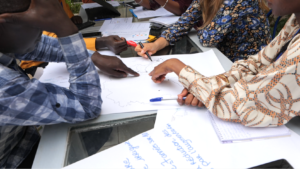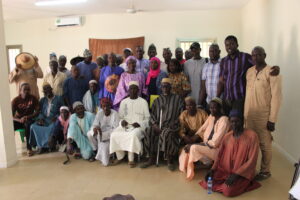
Irrigated agriculture in the Senegal river basin – New Poster
At the recent EO for Africa Symposium, held in September 2024 at the European Space Agency in Rome (Italy), Laurent Bruckmann from Université Laval presented a poster entitled ‘Mapping irrigated agriculture in the Senegal River and Delta’.
This work was completed in collaboration with colleagues from the French National Research Institute for Sustainable Development (IRD) and the Université Cheikh Anta Diop de Dakar.
Managing Water Resources and Expanding Irrigation in the Senegal River Basin
In the Senegal River Basin, managing water resources for rural development is especially challenging in the Sahel Valley. Since the 1960s, efforts to develop irrigation systems in this region have aimed to support agricultural diversification and mitigate the severe droughts of the 1970s and 1980s. Today, large-scale irrigation is one of the main agricultural systems. In the future, rural development programs will target even more irrigated areas.
New dams and reservoirs are also planned for the coming decades. However, as a transboundary watershed, the Senegal River Basin lacks consistent, official data on irrigated lands. Many agricultural practices, especially flood recession agriculture —which uses floodwaters as a resource— remain unmonitored by official services. Within the water-energy-food-ecosystem (WEFE) nexus context, the ability to monitor these water-dependent agricultural systems is essential.
A Data-Driven Framework for Monitoring Agricultural Systems
To address this data gap, the poster presents a comprehensive framework for monitoring and mapping diverse agricultural systems in the Senegal River valley and Delta. The focus is on tracking seasonal irrigation and flood-recession agriculture.
By leveraging Earth observation (EO) data and deep learning algorithms, the objective is to create a reproducible methodology for capturing these agricultural dynamics. This approach seeks to deepen our understanding of local agricultural practices, thereby facilitating informed decision-making with regard to sustainable water management and rural development.
Comprehensive Mapping of Irrigation to Strengthen the WEFE Nexus in Africa
This research proposes the first comprehensive, large-scale mapping of seasonal irrigation in the valley and delta regions, with a particular focus on flood-recession agriculture. The symposium provided an opportunity for discussions on how EO data can enhance the understanding and assessment of the WEFE nexus in Africa.
Findings of the GoNexus partners demonstrate that combining EO data with a random forest algorithm effectively maps and monitors irrigated land in the Sahelian region, generating valuable data for WEFE nexus modelling and assessment.



